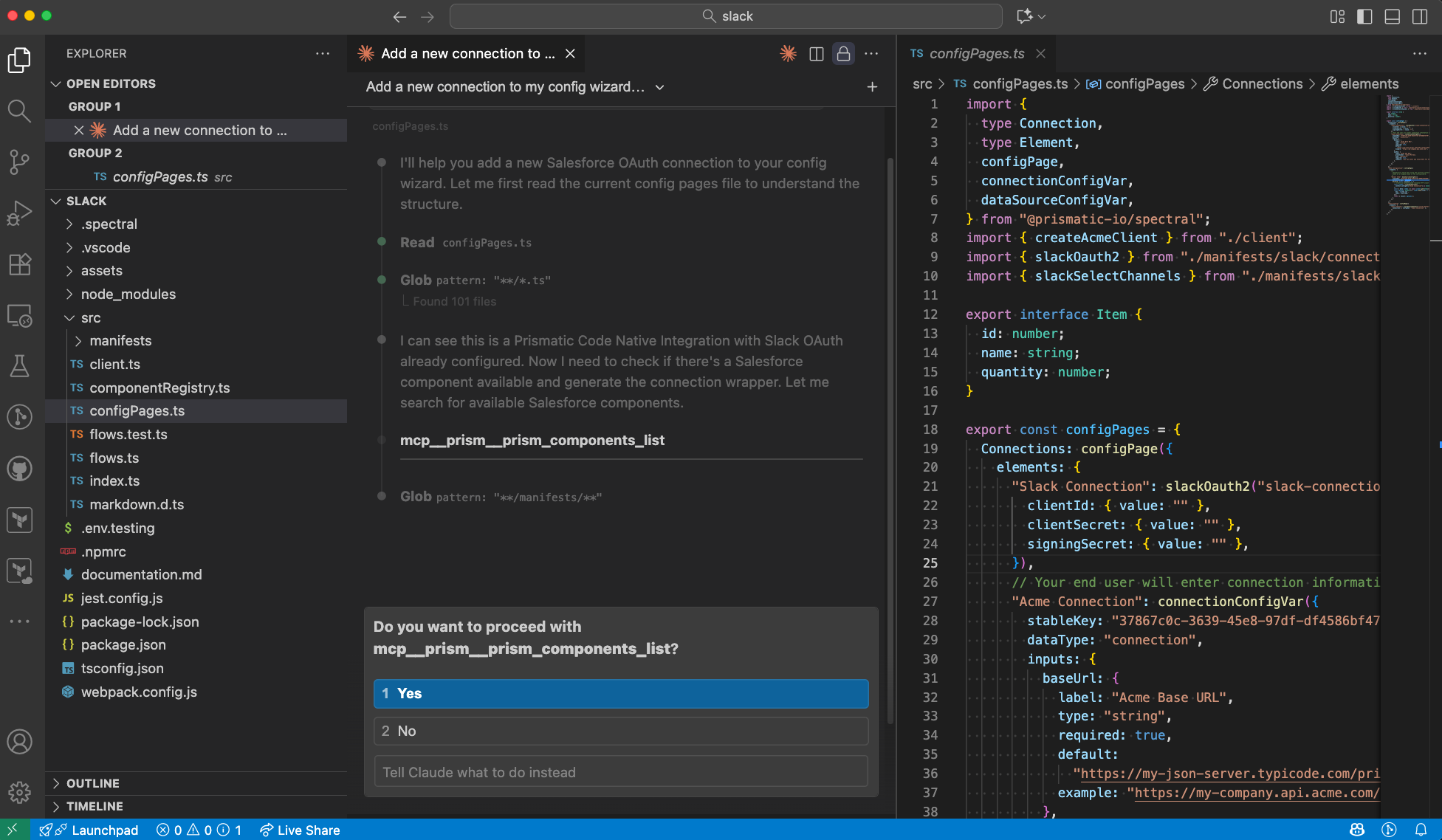Prism MCP Server
The Prism MCP Server is a local Model Context Protocol (MCP) server that helps AI assistants work with the Prismatic API for code-native integration and custom component development.
Source code for the Prism MCP server is available on GitHub.
The Prism MCP server is different from Prismatic's MCP flow server.
- This tool, the Prism MCP server, is a development tool for use with AI coding assistants to help you build custom connectors and code-native integrations.
- Prismatic's MCP flow server is a hosted service that lets AI agents interact with workflows deployed on the Prismatic platform.
You'd use this server for building integrations and connectors, and the Prismatic MCP flow server for interacting with deployed workflows.
Features
This MCP server provides several tools, organized into categories. You may register whatever set of tools are most relevant to your use case.

General tools (always available)
- prism_me: Check login status and display current user profile information
- prism_components_list: List all available components with version options
Integration tools (toolset: "integration")
Utilities
- prism_integrations_list: List all integrations
- prism_integrations_init: Initialize a new Code Native Integration
- prism_integrations_convert: Convert a Low-Code Integration's YAML file to Code Native
- prism_integrations_flows_list: List flows for an integration
- prism_integrations_flows_test: Test a flow in an integration
- prism_integrations_import: Import an integration from a specific directory
Code generation
- prism_install_component_manifest: Generate component manifest in CNI src directory (requires spectral@10.6.0 or greater)
- prism_install_legacy_component_manifest: Generate line to add to a CNI's devDependencies for legacy component manifest installation
- prism_integrations_generate_flow: Generate boilerplate file for a CNI flow
- prism_integrations_generate_config_page: Generate boilerplate code for a CNI config page
- prism_integrations_generate_config_var: Generate boilerplate code for a config variable
- prism_integrations_add_connection_config_var: Returns path to connection wrapper function if available, otherwise generates boilerplate code for a connection config variable
- prism_integrations_add_datasource_config_var: Returns path to datasource wrapper function if available, otherwise generates boilerplate code for a datasource config variable
Component tools (toolset: "component")
- prism_components_init: Initialize a new Component (supports WSDL/OpenAPI generation)
- prism_components_publish: Publish a component from a specific directory
- prism_components_generate_manifest: Generate the manifest for a Prismatic component
Toolset configuration
Tools are organized into toolsets that can be selectively enabled via the TOOLSETS environment variable:
integration- Enables all integration-related toolscomponent- Enables all component-related tools- General tools are always available regardless of toolset configuration
If no TOOLSETS environment variable is set, all tools are registered by default.
Prerequisites
-
Install the Prism CLI globally:
npm install --global @prismatic-io/prism -
Authenticate with Prismatic:
prism login
Usage
General configuration
Configuration location and methods vary slightly depending on the AI tool you are using, but the following is relatively standard. More specific instructions are below.
Example setup:
{
"mcpServers": {
"prism": {
"type": "stdio",
"command": "npx",
"args": ["-y", "@prismatic-io/prism-mcp", "."],
"env": {
"PRISMATIC_URL": "https://app.prismatic.io"
}
}
}
}
If you would like the MCP server to run in a different directory than the currently open workspace, replace the . path argument with your working directory,
{
"args": ["-y", "@prismatic-io/prism-mcp", "/path/to/code-native/integration"]
}
Command-line arguments:
-
First argument: Required. Working directory path that determines where Prism CLI commands are run from. Most coding agents (like Cursor and Claude Code) will interpret
.as the current workspace directory. If your coding agent does not support this, you can specify an absolute path of your code-native integration or custom component project instead. -
Remaining arguments: Optional. Toolsets to enable (
integration,component). If no toolsets are specified, all tools are registered by default. Being selective about toolsets may improve performance. For example, to enable only integration-related tools:{
"args": ["-y", "@prismatic-io/prism-mcp", ".", "integration"]
}
Optional environment variable options:
PRISMATIC_URL:https://app.prismatic.ioby default. If your Prismatic tenant is hosted in a different region, or if you use a private stack deployment, set this variable to your Prismatic URL.
Installing with Claude Desktop
Add the above JSON config to your claude_desktop_config.json file.
Installing with Claude Code
To use this MCP server with Claude code, add the above config to your working directory's .mcp.json configuration file.
Alternatively, run
claude mcp add-json prism '{"type":"stdio","command":"npx","args":["-y","@prismatic-io/prism-mcp","."],"env":{"PRISMATIC_URL":"https://app.prismatic.io"}}'
Installing with Cursor
You can configure available MCP Servers via Cursor Settings > MCP Tools, then add the above config to your mcp.json file.
Or, click this link to install automatically: Add MCP Server to Cursor
Installing with VS Code / GitHub Copilot
Add the above config to the .vscode/mcp.json in your workspace, or the global mcp.json file (accessible via the "Add MCP Server..." option in the Command Palette).
Or, click this link to install automatically: Add MCP Server to VS Code
Other tools
If your agent of choice is not listed, please reference their official documentation for setup instructions.